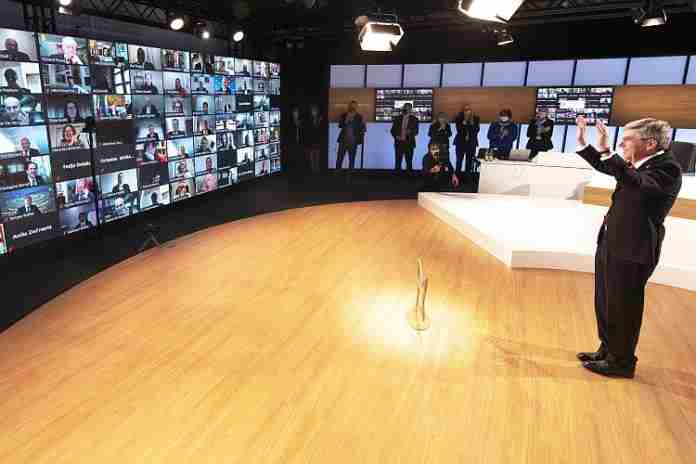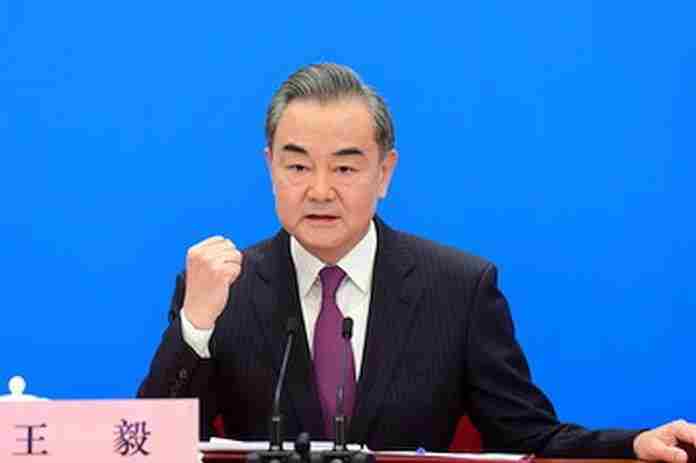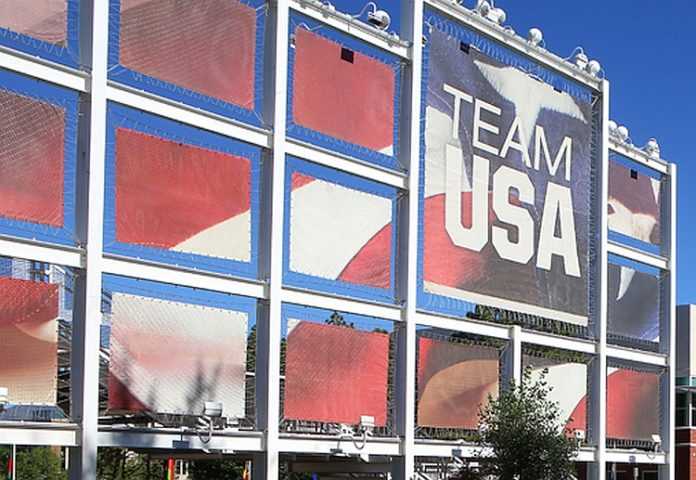The second consecutive annual meeting of the whole of the International Olympic Committee by videoconference concluded its first of three days with a 93-1 vote to re-elect Germany’s Thomas Bach as its president.
The 137th IOC Session opening by Bach underscored the determination to hold the Games of the XXXII Olympiad in Tokyo (JPN) this summer, and highlighted the continuing return to competition worldwide:
“The many world championships that have been held during these recent weeks and months are proof that sport can be organised safely and successfully, even under present restrictions. Here our thanks go to the International Federations who have organised over 270 major sporting events, meaning world championships or world cups, since September 2020. Cumulatively, these events have involved over 30,000 athletes. All of them had rigorous health and safety protocols in place, including extensive testing regimes, which far exceeded 200,000 tests.
“Not a single of these events turned into a virus-spreader. So we have clear and obvious proof that very big international sport events with a large number of international participants can be organised while safeguarding the health of everyone.
“This fact is even more significant because none of these events could benefit from vaccinations. In contrast, we are now in the very fortunate position that several vaccines are already widely in use. A considerable number of Olympic athletes is even already or about to be vaccinated in time for Tokyo. This situation will continue to improve greatly the closer we get to the Opening Ceremony.”
Bach also gave a lengthy address on the Olympic Agenda 2020 reform package which has been the foundation of his first term, including:
● “To put our reforms into a broader perspective, let us not forget the “sea of troubles” we had to navigate since 2014.
“There was the unprecedented attack on the integrity of the Olympic Games with the systemic manipulation of the anti-doping system at the Olympic Winter Games Sochi 2014. We responded with our toughest sanction: the suspension of the Russian Olympic Committee from the Olympic Winter Games PyeongChang 2018.
“The Olympic Games Rio 2016 were on the brink before and during the Olympic Games
because of the unprecedented political, economic, ethical and social crisis in Brazil. We met
this challenge with an equally unprecedented investment and concerted effort by the IOC,
the IFs and NOCs. …
“The Olympic Winter Games PyeongChang 2018 were on the brink because of the threat of
war and confrontation on the Korean Peninsula, just a few months before the opening.”
● “A major way that we have strengthened the credibility of the IOC was by revolutionising the candidature procedure for Olympic Games. Let us not forget the situation we were facing before Olympic Agenda 2020. The procedure was like applying for a business franchise – the IOC setting the conditions for the tender. Potential candidates wanting to outbid each other spent tens of millions in the process. When not being elected, the candidates were considered as losers at home and could not justify another candidature anymore. On top of that, we were facing serious ethical problems because of lobbying misconduct. As a result, we had less and less candidates and our reputation suffered.
“With Olympic Agenda 2020, we have turned this page. We introduced a more targeted and flexible approach to electing future hosts. We are ensuring that the Olympic Games are now fully aligned with the long-term plans and needs of Olympic hosts and of their communities. The new approach is focused on keeping costs to a minimum and it prevents undue influence and lobbying.
“Our revolution had immediate positive results.
“Soon after you approved the reforms in 2019, we received declarations of interest from more parties than we had seen for many, many years.
“Costs were significantly reduced. Before Olympic Agenda 2020, the average budget of candidates for the Olympic Winter Games 2022 was approximately 35 million US dollars. With the Olympic Agenda 2020 reforms, this average budget for the Olympic Winter Games 2026 was down to less than 5 million dollars – a reduction of 80 per cent. According to all information we have, we can safely expect the same reduction or even better with regards to the Olympic Games 2032.”
● “The credibility and trust we now enjoy with our Olympic Agenda 2020 reforms can even be measured in figures. Before Olympic Agenda 2020, the revenues from the TOP Programme were at about 1 billion dollars. With Olympic Agenda 2020, they are projected to triple to 3 billion for the Olympiad 2021-2024. What is more, we have already now, in 2021, secured contracts worth 4.1 billion dollars with TOP Partners and Rights-Holding Broadcasters for the Olympiad 2029-2032.”
In his acceptance remarks after being re-elected for a four-year term that will end in 2025, Bach doubled down on his devotion to solidarity, suggesting that the Olympic motto of Citius, Altius, Fortius by modified by the addition of “– communis” or “Faster, Higher, Stronger – together.”
Bach gave a short news conference afterwards, passing on specifics about foreign spectators at the Tokyo Games until after tomorrow’s presentation by the Tokyo organizers, but noting that while the question of foreign spectators needs to be resolved soon, the question of how many fans can attend the Games should wait as long as possible to take advantage of the latest development in safety.
He was also chided about the lack of dissent within the IOC over his reforms and actions; Bach had a ready reply which is instructive not only now, but for the future:
“Good governance is not only there if the people agree with your opinion or the opinion of others. Good governance is about that everybody has the opportunity to express his or her opinion.”
Bach was also asked about future challenges. Although not aimed at discussions about Beijing 2022 and China’s persecution of its Uyghur population especially, he offered a key insight:
“We will continue – within our remit – to contribute to a better and more inclusive society. Whether it’s about sustainability, whether it’s about climate change, whether it’s about credibility or you name it; but we have to stick to our remits there. (Emphasis added)
“I have not been elected there today to be a political leader and the IOC has no political mandate. And we can accomplish our mission only as we have it enshrined in the Olympic Charter, if we respect the political neutrality. And all what you have seen today, how we are working with the U.N. system, and with so many stakeholders; all this is only possible if we stick to this political neutrality, but emphasize in the same way … that we are reinforcing and strengthening our efforts how sport can be a really important enabler for achieving the U.N. Sustainable development goals through and with sport.”
For those not deeply conversant with the British noun “remit,” it is defined as:
“The area that a person or group of people in authority has responsibility for or control over.”
Translation: look for the IOC to stay as far away as it can from questions about China and the Uyghurs ahead of the 2022 Winter Games. Bach has succeeded greatly as IOC President in making his organization in specific and the Olympic Movement in general more accountable, more responsible and better managed, but he sees no way that the Olympic Games can effectively impact a government’s actions through something as actually trivial as competitive sport.
Rich Perelman
Editor
You can receive our exclusive TSX Report by e-mail by clicking here. You can also refer a friend by clicking here, and can donate here to keep this site going.
For our 649-event International Sports Calendar for 2021 and beyond, by date and by sport, click here!


























